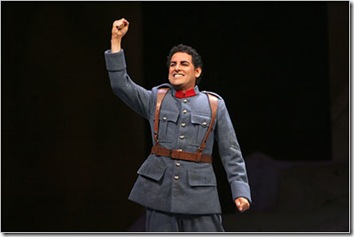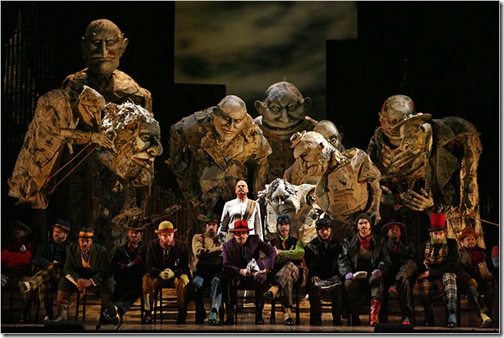Brian Lamb shared an
amazing blog post about his recent
NMC Mashup session. Not quite sure why I did not get a trackback for Brian’s work as he mentioned me (and my comments) by name, so thankfully I got a Google blog post alert about it.
I spent a lot of time thinking about Brian’s post–his reflection, authenticity, model instructional strategies to discussing educational experiences, and the like–so finally posted my own musings on his blog this morning. I copied and pasted it verbatim (save for one spelling correction) here as a record of my own thinking.
I have been reading and rereading this post for a few days, Brian, and appreciate your reflection and then sharing this for open discussion. I suppose this is becoming a metareflective opportunity, and I think I need to finally process my own thoughts enough to share them as well.
I saw Philip Glass’ opera Satyagraha this past Monday evening, and your presentation came to mind when I started to process that work. I was expecting an opera about the early life of Gandhi, yet with it sung in Sanskrit, intentionally without subtitles, the focus is forced to change. The hypnotic chorus, repetitive music, and postmodern set together made this a work that was not only unexpected, but boundary-pushing for the Metropolitan Opera (and me as well).
I see my role as an education professional to push my students to expand their boundaries (learning) while facilitating the process and maintaining some sense of safety for those who need to hold on while confronting the learning ahead of them. I felt that at the Met (the safety of being at the premier US opera stage with its desire to promote and expand culture in this art form), and have been considering why I have such a hunch there is some connection between it and your work during the Mashup.
I have heard you present and read your work for some time now, and that is the stable (safe) part of your presentation. I trust you not to take us someplace meaningless, and that is why I attended the entire session rather than leaving it mid-way when I was completely disoriented (to be honest, I don’t dance in the first world, either). Had it been somebody I did not know or was not known by those people I read, I would not have even bothered to comment at all, chalking it up to an unusual experience, period.
The fact you lose sleep over comments demonstrates (to me) that you take your work seriously and are in many ways helping to move education in an electronic age along. Pushing boundaries is never an easy business to be in, and having a hard skin seems to me to be a great asset when people are used to the status quo. So much for non-educators thinking education is a safe and easy profession to be in . . .
I am convinced that education challenges the status quo, and as educators sometimes we need to shake things up to help people see there are other ways to look at issues. Where else can growth come from?
With this said, I am really glad that this session has sparked discussion–the educator’s dream! Without it, we never know what we have done has worked if at all. As we often do not see the results of our work, these online discussions are testament that reflective practice and learning is happening. I am now beginning to wonder where it is going . . .
I think there has been such great discussion on this event, and wish more educational initiatives sparked the same sort of interest and reflective practice.
 The New York Times’ review for La Fille du Regiment isin, and as I predicted two days ago after I saw the premiere, it was fantastic.
The New York Times’ review for La Fille du Regiment isin, and as I predicted two days ago after I saw the premiere, it was fantastic. 
